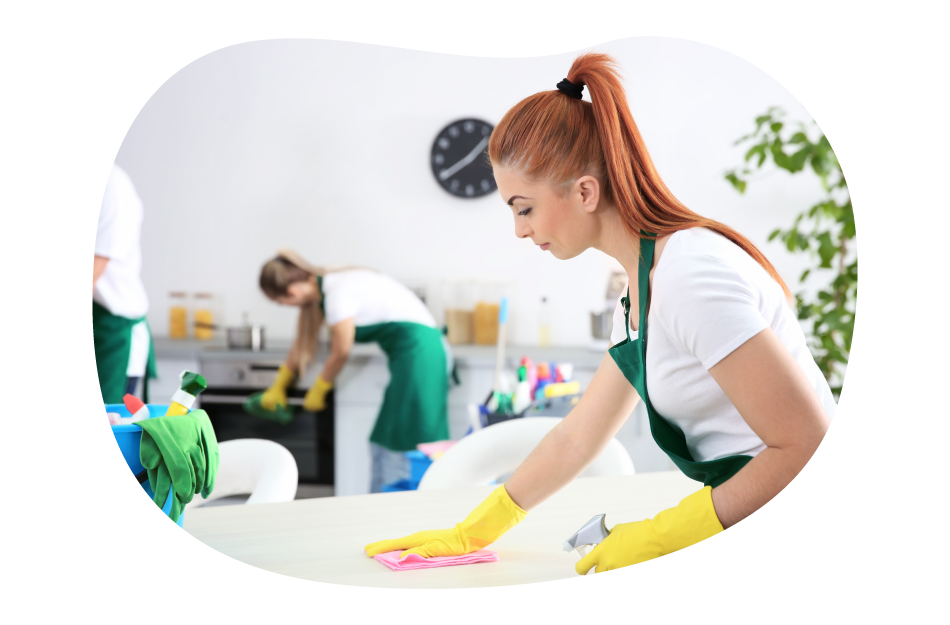

Why is business insurance a must for house cleaners?
Should a client suffer an injury from slipping on a wet floor or an employee steals property from their home, housekeeping insurance would help cover your legal fees. What's more, some clients may require proof of insurance before they'll hire you.

Get the right insurance
6 insurance policies every house cleaner should consider
These policies protect against the most common risks house cleaners face.
General liability insurance
This policy protects house cleaners against legal costs related to third-party property damage and injuries, such as a client slipping on a wet floor. It's often required by commercial leases and contracts.
- Slip-and-fall injuries
- Accidental damage to a client's property
- Libel and other advertising injuries
Workers' comp insurance
Most states require home cleaning businesses with employees to carry workers' comp. Health insurance can deny claims for on-the-job injuries, which makes this policy valuable for sole proprietors too.
- Medical bills for injured workers
- Disability benefits
- Lawsuits from workplace accidents
Commercial auto insurance
Business vehicles owned by a house cleaner must have this coverage to comply with state laws. It helps pay for financial losses in an accident, including legal costs and property repairs.
- Auto accident injuries
- Auto accident property damage
- Theft of a cleaning van or other vehicle
Business owner's policy
Small home cleaning businesses and contractors are usually eligible for a business owner's policy (BOP), which bundles general liability and commercial property insurance at a discount.
- Client bodily injuries
- Damaged customer property
- Stolen or damaged business property
Commercial umbrella insurance
Umbrella insurance boosts the protection of your general liability, commercial auto, or employer's liability insurance policy once the limit is reached on a claim.
- Personal injury lawsuits
- Auto accident lawsuits
- Workplace injury lawsuits
Fidelity bonds
Clients might ask your business to secure a fidelity bond, also called a janitorial bond, before they will allow your workers on their premises. It reimburses the client in the event of employee theft.
- Theft of cash or property
- Forgery
- Illegal funds transfer
House cleaner insurance costs

From our customer data, here's a quick look at the average costs of common house cleaner insurance policies:
General liability: $44 per month
Business owner's policy: $69 per month
Workers' compensation: $116 per month
Factors that can influence house cleaning business insurance costs include:
- Cleaning services offered, such as carpet cleaning or window cleaning
- Number of employees
- Types of insurance purchased
- Coverage limits and deductibles
- Claims history
Hear from business owners like you who purchased insurance coverage.
Why house cleaners choose TechInsurance
Get insured quickly with TechInsurance
Get insurance fast so you can get started working with clients. Fill out our easy online application, choose a policy, and pay online to start coverage today.

Common questions about house cleaning insurance
Find answers to frequently asked questions about house cleaning business insurance.
Is my house cleaning business required to have a license?
Typically, house cleaners don't need a specialized business license to operate. However, you'll most likely need to file for a general business license and register with your state.
With a general business license, you'll be able to collect and report sales tax on any cleaning supplies you purchase, if you're charging your clients for the products you use.
When registering your business, if you call your business by any name other than your own, you'll need a doing business as (DBA) license to operate legally.
Depending on the state you work in, you may need a specific license, bond, or permit to comply with area laws. If your company regularly deals with cleaning product disposal or harsh cleaning agents, you may have obtain a special permit that's regulated by the Environmental Protection Agency (EPA).
You should also check with your municipality and city for any additional licensing, bonding, and insurance requirements specific to your business.
Does my house cleaning business need a bond?
There are several reasons a cleaning business might decide to buy a janitorial bond:
- It protects clients. Should an employee steal from a client, your client would be reimbursed by the bond up to the limit.
- It's required. Some states, counties, and cities mandate a bond as part of the requirements for getting a cleaning business license.
- Client's request it. Some clients will require your company, especially government entities, to carry a bond before they'll allow your employees on their premises.
- It attracts new customers. Clients prefer to work with a bonded and insured company over one that doesn't carry this protection. A bond shows clients your business is reliable and guarantees reimbursement in the event of theft.
It's important to note you may also see this kind of bond referred to as a surety bond or fidelity bond.
What other insurance coverage do house cleaning service businesses need?
When building a comprehensive risk management plan for a house cleaning business, small business owners may need additional types of insurance, outside of general liability coverage and workers' compensation insurance, to cover all risks and liabilities.
Some policies house cleaners and maid service businesses should consider for complete peace of mind are:
- Hired and non-owned auto (HNOA) insurance covers work-related accidents if you or your employees use personal, leased, or rented vehicles for work. Most personal auto insurance policies are unlikely to cover these types of claims, like taking supplies to a job site, running a work errand, or visiting a client's home in your personal car.
- Inland marine insurance safeguards your business property (such as products, tools, and equipment) while it's in transit or stored at an off-site location. Specifically, contractor's tools and equipment coverage is perfect for cleaning companies that use cleaning equipment valued at less than $10k and is less than five years old, like a carpet cleaner.
- Commercial property insurance protects against financial losses from fires, storms, and burglaries. This policy is important to carry since homeowner's insurance provides little to no protection for business property.


